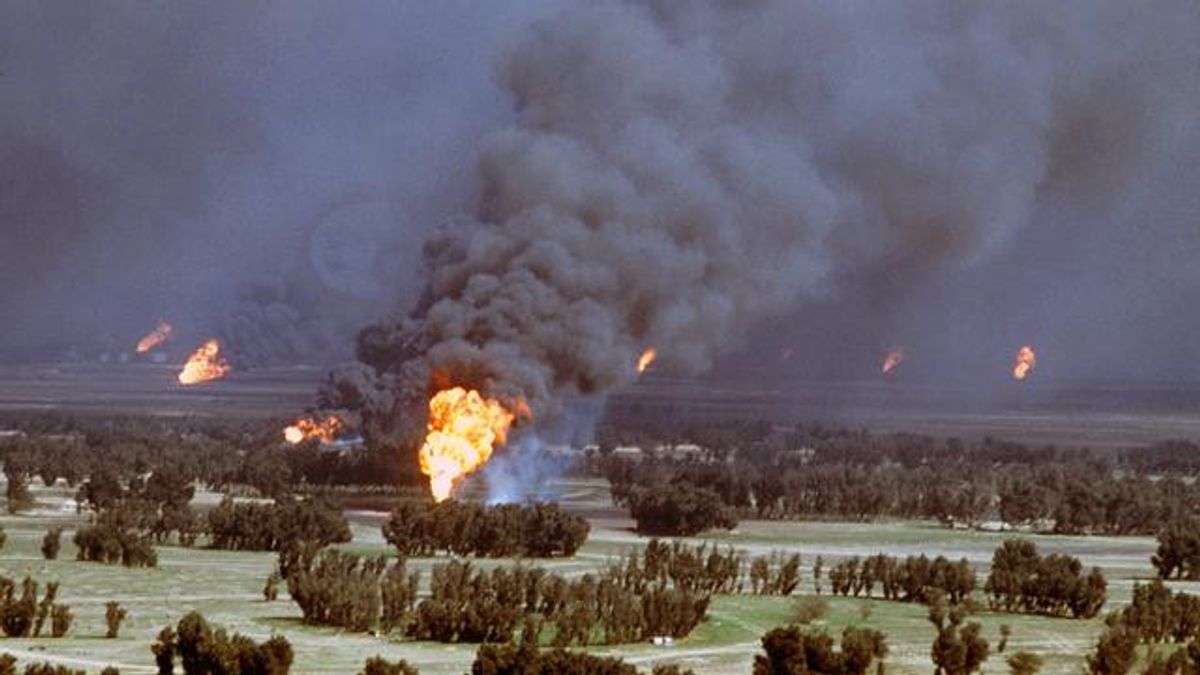JAKARTA - Early morning on August 2, 1990 Iraqi troops invaded Kuwait. This invasion marked the beginning of the Second Gulf War in which the superpower United States was involved in the war. This invasion did indeed threaten US interests in Kuwait, considering that there were many oil fields there that poured coffers into the country.
The Iraqi attack overwhelmed the Kuwaiti defense forces and some scrambled to Saudi Arabia. The emir of Kuwait, his family and government leaders, for example, fled to the monarchy.
Within hours Kuwait was captured and Iraq established a provincial government. By invading Kuwait, Iraq controlled 20 percent of the world's oil reserves and a substantial coastline in the Persian Gulf. Iraqi jets bombed the Kuwaiti capital and special forces landed at the Ministry of Defense and at the Emir's palace.
Meanwhile, roadblocks were carried out as well as looting of town shops. Initial reports suggest up to 200 people were killed in heavy firefights around the city.
According to the BBC, the younger brother of Emir Sheikh Jaber al-Sabah was killed while trying to defend the palace which was raided by Iraq. All communications were cut off with Kuwait and many people, including thousands of foreign nationals were trapped.
Iraq, then led by Sadam Hussein, wanted to gain more control over lucrative oil supplies from the Middle East. Hussein's disappointment with Middle Eastern countries was also a factor in the invasion of Kuwait. Iraq is considered indebted to Kuwait for the needs of the Iran-Iraq war. Iraq also has debts to other Middle Eastern countries.

In the weeks leading up to the invasion, Iraq continued to accuse Kuwait of flooding world markets with oil and demand compensation for oil produced from disputed oil fields on the two countries' borders. After the invasion, oil prices rose dramatically and stock markets around the world fell.
Sadam Hussein hoped that Kuwait's oil reserves would help pay off the huge debt Iraq had accrued from the war with Iran. He also has ambitions to give Iraq significant power as a gatekeeper for Middle East oil.
Kuwaiti assets in the UK and the United States (US) were immediately frozen to prevent Iraq from seizing them. The US has also frozen Iraqi assets. The Soviet Union, Iraq's main arms supplier, suspended deliveries of all military equipment to Iraq.
The Iraqi occupation of Kuwait ceased on February 28, 1991. Iraqi troops left Kuwait, after burning hundreds of oil wells. US President George Bush declared a ceasefire, and the Gulf War ended.
Impact of invasionAll wars have an impact. After the Gulf War II ended, Iraq was ostracized by the international community. This made it more difficult for the Iraqi economy, which had already fallen due to the costs of various war necessities. In addition, the Kuwaiti economy was also devastated because many oil wells had been destroyed by Iraq.
After Gulf War II ended, the US was increasingly entangled in Middle East politics even today. The US felt most threatened when Iraq invaded Kuwait, given that many oil fields there flowed funds to the US. During Gulf War II, the US built a 34-nation coalition at the United Nations and increased the US troop strength to more than 500,000.
Citing Khan Academy, the US launched Operation Desert Storm to protect Saudi Arabia and liberate Kuwait. This operation was carried out with UN approval and targeted Iraqi Air Force forces. Then proceed with targeting the command and communication center.
The Gulf War was also the first American conflict to be shown on live television. CNN broadcast live images of exploding bombs and other war events to television. The US military continues to be in Kuwait, even adding 4,000 troops in February 2015.
The US and Iraq returned to war after the terrorist attacks of September 11, 2001. The second US war with Iraq began in 2003 after US intelligence agencies and spies around the world stated that Saddam Hussein possessed weapons of mass destruction.
In December 2002, Saddam Hussein apologized for the invasion of Kuwait and was eventually overthrown in the 2003 invasion of Iraq by the US, UK, Australia and Poland. In 2005, the Palestinian leadership also apologized for supporting Saddam Hussein. Yemenis living in Kuwait were deported by the government because Yemen supported the Iraqi invasion of Kuwait.
*Read other information about WORLD HISTORY or read other interesting articles from Putri Ainur Islam.
TODAY'S HISTORY MoreThe English, Chinese, Japanese, Arabic, and French versions are automatically generated by the AI. So there may still be inaccuracies in translating, please always see Indonesian as our main language. (system supported by DigitalSiber.id)









